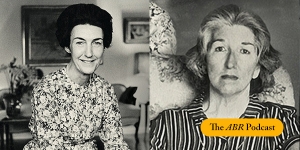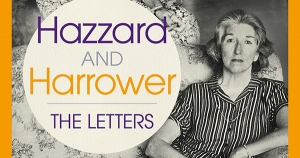Elizabeth Harrower
In this week’s ABR Podcast, Peter Rose reviews Hazzard and Harrower: The letters, edited by Brigitta Olubas and Susan Wyndham. The correspondence between writers Shirley Hazzard and Elizabeth Harrower ran from 1966 to 2008 and, in its unedited form, amounted to 400,000 words. Editors Susan Wyndham Brigitta Olubas have trimmed it down: ‘For the time being,’ says Peter Rose, ‘we must make do with this entertaining and not insubstantial entrée.’ Listen to Peter Rose’s ‘Flies in the Nirvana’: An illuminating and sisterly correspondence’, published in the June issue of ABR.
... (read more)Peter Rose reviews ‘Hazzard and Harrower: The letters’ edited by Brigitta Olubas and Susan Wyndham
‘Everyone allows that the talent of writing agreeable letters is peculiarly female.’ So said Jane Austen in Northanger Abbey. Even allowing for Regency hyperbole, there is some truth in the sally. We think of the inimitable letters of Emily Dickinson, who once wrote to a succinct correspondent: ‘It were dearer had you protracted it, but the Sparrow must not propound his crumb.’ In 2001, Gregory Kratzmann edited A Steady Stream of Correspondence: Selected Letters of Gwen Harwood, 1943-1995. Anyone who ever received a letter or postcard from Harwood – surely our finest letter writer – knows what an event that was. She was nonpareil: witty, astringent, frank, irrepressible. Now we have this welcome collection of letters written by Elizabeth Harrower and Shirley Hazzard (unalphabetised on the cover, in a possible concession to the expatriate Hazzard’s international fame).
... (read more)Susan Sheridan reviews 'Elizabeth Harrower: Critical essays' edited by Elizabeth McMahon and Brigitta Olubas
The appearance in 2014 of In Certain Circles, a new novel from Elizabeth Harrower, was an important literary event. The author, who still lives in Sydney, had published nothing since 1966 and had repeatedly maintained that she had nothing more to say. In Certain Circles had been ready for publication in 1971 ...
... (read more)Bernadette Brennan reviews 'A Few Days in the Country and Other Stories' by Elizabeth Harrower
It is gratifying to witness the renewal of interest in Elizabeth Harrower's fiction. Last year, ...
... (read more)I always felt I had urgent news to deliver. I wanted to do that more than anything else.
... (read more)Before the ceremony began, the woman with hairy legs and an air of having just abandoned a cigarette wandered as though at a party to the coffin where – though it was impossible and not so – Clelia’s mother, Margaret, was. Three days ago, four days ago, Clelia had said to her mother, ‘Come and see the blossom I’ve brought back.’ She had just returned to Sydney after a three-week absence in the mountains.
‘Can’t it come to me?’
‘No,’ she said gaily, insistently, not thinking really, never wondering. ‘No, you’ll have to come out here. It’s so tall. I can’t move the vase.’
... (read more)Bernadette Brennan reviews 'In Certain Circles' by Elizabeth Harrower
In her 2013 interview with Ramona Koval, the octogenarian Elizabeth Harrower expressed an unreserved confidence that her novels ‘deserved to be found and … would be found’ by future generations of readers. There is no doubt that Harrower’s fiction deserves to be known, but without the initiative of Text Publishing these works may well have slid into obscurity. To date Text Classics have republished three of Harrower’s novels: Down in the City (1957), The Long Prospect (1958), and The Watch Tower (1966). Now comes the release of a previously unpublished manuscript, Harrower’s fifth and final novel, In Certain Circles.
... (read more)Elizabeth Harrower’s début novel was first published by Cassell in London in 1957. Down in the City begins with a hymn to Sydney, with its beaches, harbour suburbs, city arcades – and disreputable Kings Cross, ‘a haven for the foreigner and racketeer; a beacon for long-haired boys, mascaraed women and powdered men. It is Montmartre: it is bright and wicked.’
... (read more)Kerryn Goldsworthy reviews 'The Watch Tower' by Elizabeth Harrower
‘Too many vampires,’ wrote Patrick White. The year was 1980; the document was a letter to Shirley Hazzard; the subject was their friend and fellow novelist Elizabeth Harrower, who had published nothing but a handful of uncollected short stories since 1966. ‘Elizabeth keeps her principles,’ he wrote. ‘Whether she is also writing, I have given up asking in case I get the wrong answer. Too many vampires make too many demands on her …’
... (read more)







